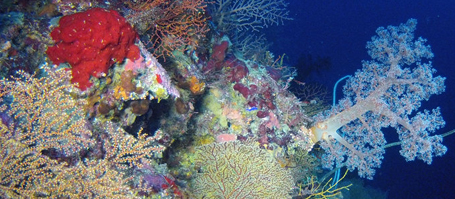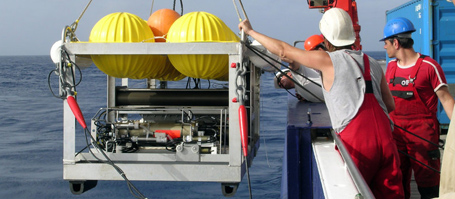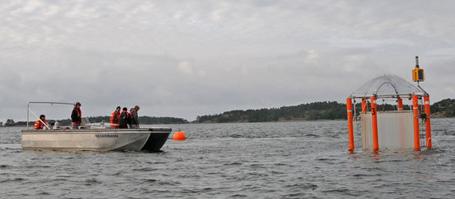Unusual flags decorated the GEOMAR Helmholtz Centre for Ocean Research Kiel. While the political situation in the Middle East remains strained, the Israeli and Palestinian flags fly next to each other on Kiel’s east shore in the cold winter wind. On Friday, scientists from Israel, and Palestine along with colleagues from Germany met in Kiel to present the results of their joint research project TRION to representatives of the German Research Foundation (DFG). Since 2012 the participants have not only been carrying out innovative research in the reconstruction of metal transport from land into the Red Sea and its incorporation in the form of metal ions in coral skeletons; they have also been contributing to international understanding. Today, following the end of the first phase, an evaluation was carried out by the DFG, which finances TRION with 700,000 Euros. “Not all results of the first phase have been published yet; however we have already gained lots of new insight into the transport of trace metals into the corals” says Professor Dr. Anton Eisenhauer from GEOMAR.
Corals need trace metals to build their delicate coral skeletons. In order to absorb these metals, or initially metal ions, in the right quantity at the right time, corals have developed a complex physiology. “We want to decipher this mechanism to understand how corals handle situations such as ocean acidification. Moreover we can learn how to create calcium carbonate with minimal effort” explains Professor Eisenhauer. The information about the metal transport is saved in the coral skeletons. “One only needs to use the correct methods to read the information” says the Kiel specialist for isotope analysis. Together with Israeli and Palestinian colleagues, GEOMAR researchers have developed an all new procedure for isotope measurement which was used for the first time on the corals in the Red Sea for TRION. “It even allows the tracking of the metal flow through the cell structure to the area of calcification on a cellular level” emphasizes Eisenhauer.
The unusual choice of project partners for TRION was, from the start, a component of trust building. “We wanted to contribute to the peace process in this unsettled region” says Eisenhauer. German, Israeli and Palestinian scientists, PhD students and graduates are working together, combining teaching and research. This has included courses in the Integrated School of Ocean Sciences (ISOS) of the Cluster of Excellence “The Future Ocean” in Kiel. In addition German and Palestinian students and scientists have spent time in Israel and vice versa. “Thus we have created a network in which, despite political problems, trustworthy research can be done. Science offers a platform with which we can contribute a little to international understanding” summarizes Prof. Eisenhauer confidently.
Following a successful evaluation, the project enters into the second phase. lasting until 2015. “Scientifically, we still have many questions to answer. In the upcoming year we want to conduct laboratory studies and field campaigns, and compare the data obtained to improve our understanding of the coral’s classification process. Moreover, with the current political situation, trust building is more important than ever before” says Eisenhauer.
TRION-Partners:
GEOMAR Helmholtz Centre for Ocean Research Kiel
AlQuds University, AQU, Palestinian territories
Geological Survey of Israel, GSI, Israel
The Hebrew University of Jerusalem, HUJI, Israel
Graz University of Technology, TU Graz, Austria
Links:
www.futureocean.org The Cluster of Excellence “The Future Ocean”
www.geomar.de/go/trion The Project TRION
www.alquds.edu/en AlQuds University, AQU, palästinensische Autonomiegebiete
www.gsi.gov.il/eng Geological Survey of Israel
www.huji.ac.il/huji/eng/index_e.htm The Hebrew University of Jerusalem, HUJI, Israel
www.tugraz.at TU Graz
Contact:
Prof Dr. Anton Eisenhauer (GEOMAR, FB2-Marine Geosystems),
aeisenhauer@geomar.de
Jan Steffen (GEOMAR, Communication & Media), Tel.: (0049) 431 600-2811,
jsteffen@geomar.de
…


